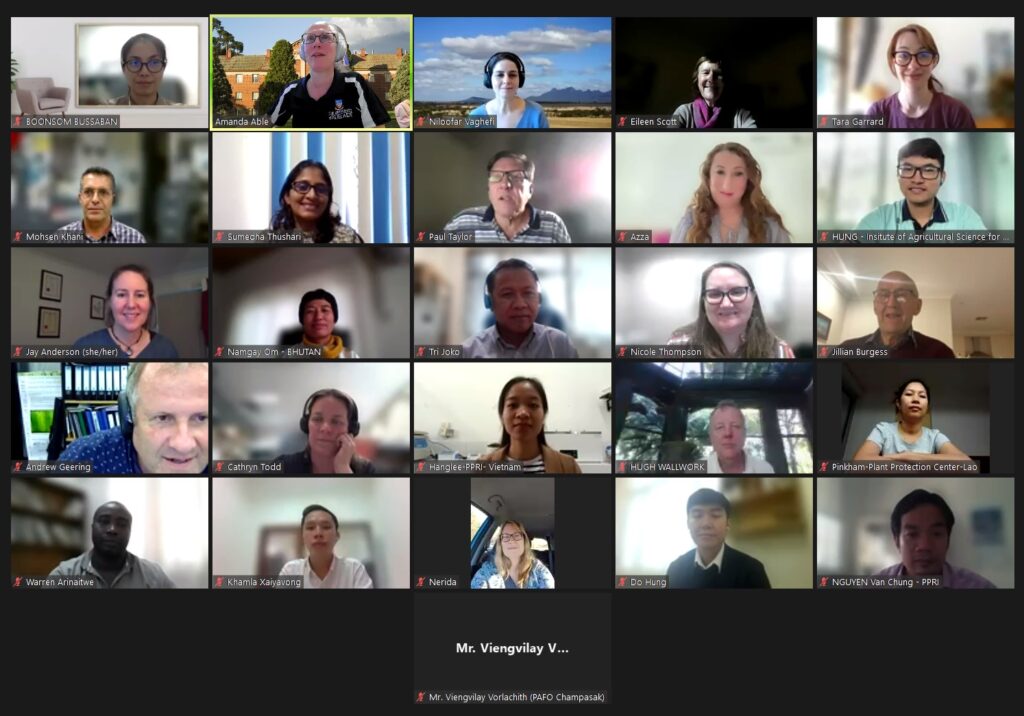

Extending the reach of plant pathology expertise with training
April 16, 2024
The Victorian Crawford Fund supported four plant pathology scientists from Fiji, Philippines, Thailand and Tunisia to participate in an online Developing Countries Workshop held in conjunction with the 2023 Australasian Plant Pathology conference.
The scientists were Dr Amit Sukal from the Centre for Pacific Crops and Trees (CePaCT), Pacific Community in Fiji; Dr Boonsom Bussaban from Faculty of Science, Chiang Mai University, Thailand; Dr Mark Balendres at De La Salle University in Philippines; and Dr Azza Rhaiem from the National Gene Bank in Tunisia.
“The APPS Developing Countries Bursary aimed to provide early career plant pathologists from developing countries the opportunity to learn best practices and developing technologies from leaders in the plant pathology profession,” said Paul Taylor, Honorary Professorial Fellow at the University of Melbourne.
“The recipients were nominated based on their importance to plant pathology research and extension to local industries within their organisations,” he said.
The four international bursary recipients were mentored by Prof Paul Taylor and Dr Niloofar Vaghefi, from the University of Melbourne, two plant pathologists with a wealth of experience in running training programs and mentoring plant pathologists in developing countries in Asia and the Pacific region.

Online participants of the Developing Countries Workshop held in conjunction with the 2023 Australasian Plant Pathology conference.
The workshop was divided into four sessions with four participants in each session which covered a wide range of topics from biosecurity, diagnostics and emerging diseases. Each bursary recipient presented a pre-recorded presentation which was then followed by questions facilitated by the Chairs of each session.
Following the workshop the bursary recipients were also provided with access to the on-demand virtual platform for the APPS conference.
“The workshop provided good opportunity for interaction between the participants and their mentors which will lead onto further collaborative programs including joint research projects and in-country training in basic plant pathology, disease control and biosecurity,” said Paul.
The participants have an ongoing engagement (or collaboration) with their mentors and peers. In addition, their learnt skills and knowledge in the areas of biosecurity, diagnostics and emerging disease contributes significantly to the capacity of developing nations to strategically manage plant disease to maintain food security.
The relationship of each participant with their mentors will enhance closer collaborations in areas of basic plant pathology, disease control and biosecurity through further projects to identify fungal plant pathogens causing diseases of important crops and development of molecular diagnostics explained Prof Taylor. For example:
- The collaboration with Dr Sukal at the Centre for Pacific Crops and Trees (CePaCT), Pacific Community in Fiji will lead to the development of a project to identify the cause of anthracnose of vegetable and fruit crops in Fiji and the Pacific Community.
- Dr Bussaban at Chiang Mai University, Thailand and Prof Taylor have developed a collaborative project on identifying fungal diseases of citrus trees, as well as mentoring of graduate students in plant pathology.
- Dr Balendres at De La Salle University in Philippines and Dr Vaghefi are developing a training program for identification of pathogens associated with yield decline and anthracnose of fruit and vegetables in the Philippines.
- Dr Rhaiem from the National Gene Bank in Tunisia has an ongoing collaboration with Prof Taylor on fungal taxonomy and culture collections.
“This unique online workshop was able to strengthen partnerships between the University of Melbourne, the participant’s institutes and countries and the Crawford Fund by creating excellent working relationships,” said Prof Taylor.
“These collaborations will encourage the sharing of knowledge on presence of plant pathogens within a country and which may pose a threat to other countries if brought in through imported produce,” he concluded.




 0
0